Advent and adventure.
An auspicious New York Philharmonic conducting debut, an exclusive Q&A with the new Music Director of Trinity Wall Street, and a holiday event worth supporting.
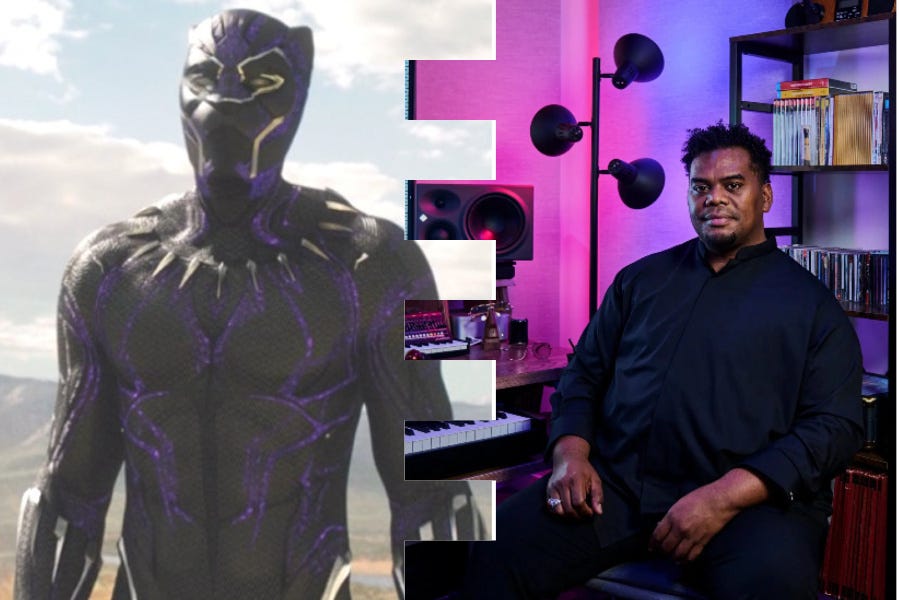
I first spoke with conductor Anthony Parnther when I wrote about the Gateways Music Festival for a New York Times feature in October. In the end, I couldn’t squeeze our great chat into that article. But I determined that I’d follow up with a feature based solely on his own amazing story. Then I saw he’d be making his New York Philharmonic debut conducting Ludwig Göransson’s Academy Award-winning score for Black Panther with screenings of the film in December.
Et voilà! Here’s my New York Times feature on Parnther, who conducts Black Panther Wednesday, Dec. 20, through Saturday, Dec. 23, at David Geffen Hall. You’ll find ticket information here.
(Want a real challenge? Try typing Parnther and Panther repeatedly in a 1,000-word story without screwing up—or overlooking an erroneous auto-correction.)
As always, there was plenty in this conversation and in my secondary interviews that didn’t make the final edit: for example, Parnther’s candid response when I asked whether most of his engagements at major orchestras across the United States still fall outside of subscription-series offerings.
“There was a time for many years where my Februarys were awfully booked up,” he acknowledged, alluding to Black History Month.
But, he pointed out, the tide is turning. For instance, Parnther conducted Black Panther at the Atlanta Symphony Orchestra in 2021. The ASO had him back in November for a subscription-series program that clearly reflected his own values and priorities: a new piece by Chanda Dancy, a symphony by Florence Price, and The Five Sacred Trees, a bassoon concerto by John Williams. (Parnther even brought out his own world-famous bassoon for an encore.) You can read reviews of the event by Pierre Ruhe on ArtsATL, and by Mark Gresham on EarRelevant.
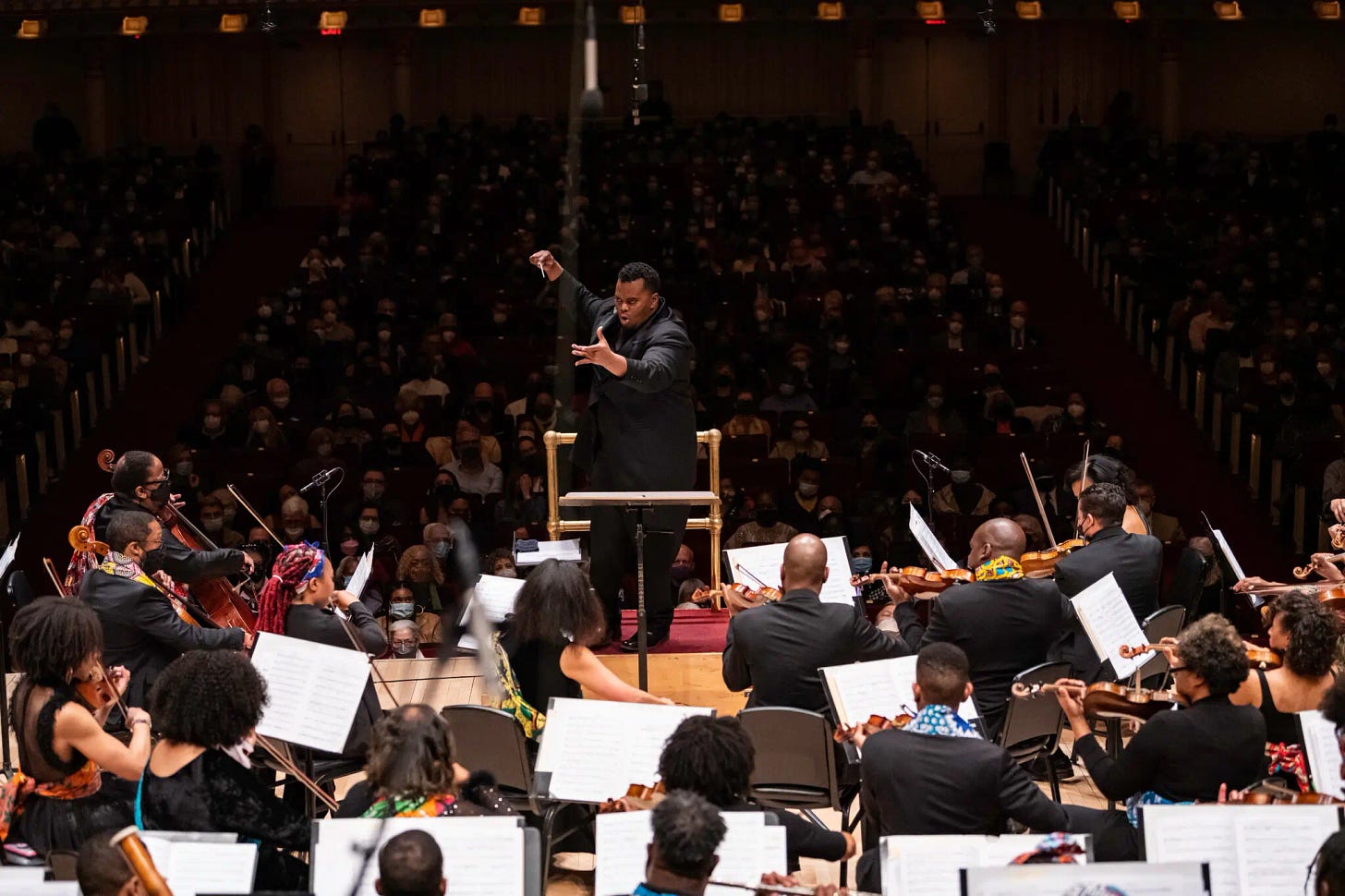
This time, it was New York Philharmonic executive director Gary Ginstling who got left on the cutting room floor. “He’s a personality on the podium,” Ginstling said of Parnther, “and he brings that personality to whatever music he is conducting.” Last year, as executive director of the National Symphony Orchestra in Washington, D.C., Ginstling engaged Parnther for what turned out to be a memorable “In Your Neighborhood” community-outreach concert:
We did a program that had everything from a movement of a Tchaikovsky String Serenade to a movement of Piazzolla’s Four Seasons [of Buenos Aires] for violin, some Mozart, Carlos Simon, Samuel Coleridge-Taylor, and a collaboration with a local string trio from D.C. called The String Queens—and they were doing arrangements of Adele songs with the orchestra. All this in a one-hour or a 75-minute program—to me, that says everything you need to know about Anthony.
I’m grateful to Anthony for his generosity and candor, to New York Times dance & classical music editor Rachel Saltz for the assignment, to Jessica Lustig at 21c Media for vital details and endless assistance, and to my reliably brilliant wife, Lara Pellegrinelli, who helped me craft a lede far more arresting than what I’d concocted to start with.
Last word: watch out for Anthony Parnther’s recording of Anthony Davis’s The Central Park Five with Long Beach Opera, coming soon (hopefully) on a label to be determined. It is electrifying—full stop.
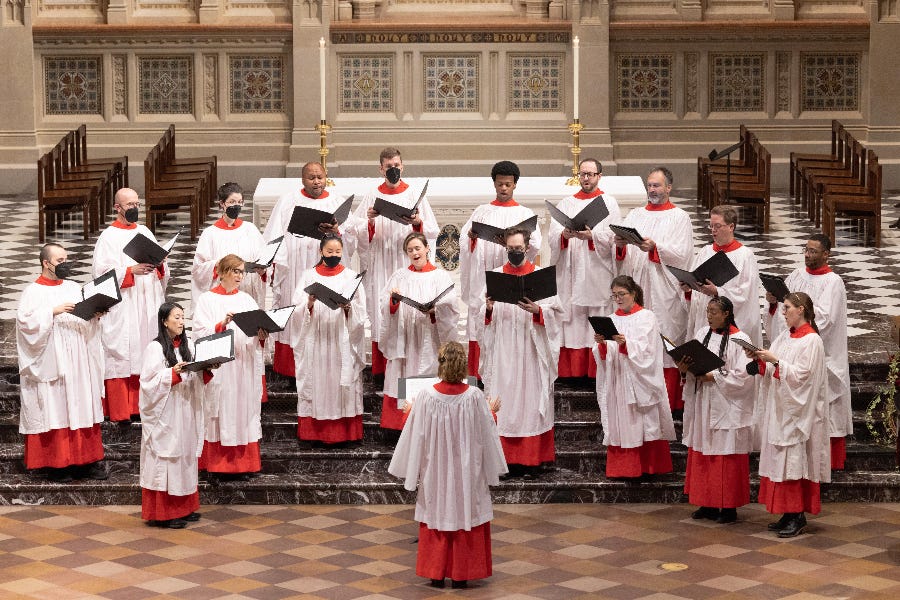
Q&A: Melissa Attebury, Trinity Wall Street
After a 20-month stretch during which one of New York City’s most significant church music programs had no official leader, the historic Lower Manhattan church Trinity Wall Street has appointed Melissa Attebury its new Director of Music. Attebury, a mezzo-soprano and conductor, has been involved with Trinity and its celebrated choirs since 2006: first as a singer, then more recently as Director of Music Education and Outreach, and Associate Director of Music.
In a media statement, Trinity Church rector the Rev. Phillip A. Jackson expressed his support for Attebury:
Melissa carries the music of Trinity Church in her bones, and over the last two years has done extraordinary work with our internal teams to bring new music and an array of brilliant guest conductors and musicians to our audiences. She is respected not just for her musicianship, but also for her collaborative leadership, and I’m thrilled to have her at the helm of Trinity’s music program.
Attebury, the first woman appointed to run Trinity’s powerhouse program, assumes her new role in the wake of turmoil surrounding her predecessor, Julian Wachner, who last year was removed from his post following charges of sexual misconduct, which he has denied. The director who preceded Wachner, Owen Burdick, was credited with building up the church’s internationally renowned music program before he was fired, swiftly and quietly, in 2008, for causes eventually revealed to have related to his struggle with alcoholism.
Despite those serious issues and related setbacks, the Trinity music department has unfailingly fulfilled its liturgical obligations. The church has sustained its multiple choral and instrumental ensembles, and mounted noteworthy premieres and ambitious themed programs like “Renewal,” based on the work of novelist Richard Powers, who participated.
Trinity has also continued to work with outside organizations and producers in special projects, like the staged performance of John Adams’s nativity oratorio, El Niño, that American Modern Opera Company will present on Thursday, Dec. 21, at the Cathedral of St. John the Divine. Forthcoming collaborations include the New York City premiere of Huang Ruo’s Angel Island, produced by PROTOTYPE at the BAM Harvey in January, and the world premiere of Luna Pearl Woolf’s Number Our Days: A Photographic Oratorio at PAC-NYC in April.
In a recent interview conducted via Zoom, Attebury discussed her work with Trinity, her plans looking ahead, and in particular the church’s continuing commitment to commissioning and presenting contemporary concert music. This transcript has been lightly edited for clarity and concision.
Full disclosure: My daughter, age 9, has been active as a singer in Trinity’s children’s choirs for several years now.
Steve Smith: As a singer, a teaching artist, and Associate Director, the Trinity family has seen a lot of you since 2006. Is this step something you might have envisioned happening here, or elsewhere, as part of your career trajectory or aspirations?
Melissa Attebury: I’ll be very honest with you: my most recent position was Director of Music Education and Outreach, which I was promoted to in the past year, and in that role, I was quite busy. We have a huge team of teaching artists that work in that department—it’s a whole huge subset, separate from the music department and the work we do. I really, really loved that work and enjoyed it so much, because so much of my time here has been spent on education.
At the same time, in my role as Associate Director for several years, I managed our budget for the music department. So that has always kind of been under my purview, as well as several other administrative duties. So when the Vicar and Rector asked me to consider taking this position… it wasn’t that I was shocked. There was one part of me that thought, well, of course this makes sense, because if you look at this on paper, this is exactly what I’ve been doing.
But there was definitely kind of a sense of awe and wonder: Can I do this now, and raise this to the next level, and be the principal conductor of all of the ensembles? They asked me to think on it for a little bit before I made a decision. And I had some serious prayer and thought on my own, without talking to even my family about it. I just wanted to consider what that would look like.
There were two things. One, because education is so very important to what I have been doing here at Trinity – it runs in my blood, my mom was a music educator – it is so important to me that we continue to teach the next generation. And then two, because I’m a performer – I was trained as a singer, and I have so much performing experience in my background and as part of my career – knowing that there would be a real shift, because taking on a position like this means that I’m really in the leadership role. Am I ready at this point in my life to make that switch?
I didn’t have to think about it very long. [Laughs] I was absolutely ready. It felt like a calling. And it felt like this was the right place and the right time and the right decision to do this, knowing I have a really strong team in place with music education that can help continue the work we’ve been doing, and knowing that our ensembles need a leader at this point to take us to the netep.
Did you have any sense, coming into this role, that the institution might need to mend and restore confidence after going through a challenging time?
I can’t speak to the institution itself, but since this announcement has been made, I’ve received a lot of support and just an overwhelmingly positive response from people. And one of the words that people have said to me over and over is stability. That has been a really common theme of something that people have wished for for a long time—which happens in any kind of transition, of course, no matter what came before. Stability, and a very calm and confident leader: those are things that I’ve heard coming to me, and that is in line with what Trinity would be looking for in a leader in any position.
It’s probably premature to ask for specifics, but what are your primary goals and challenges as you head towards the ’24–’25 season?
I have three main main points that I’ve been thinking about in this new chapter. Education is still paramount to me, being able to train our young people and continuing to expand that program. And not only with our children and youth, but with our young adults. We have a scholars program now at Trinity for young musicians that have maybe graduated college, or are doing a gap year, waiting to take that next step. I think that is so important: to train that group of people in the twenties area. They need the opportunity to learn how to make music in this way, and be able to do it side-by-side with pros.
So education of… everyone [laughs] is still very important—which then leads to congregational singing. With the pandemic, as you know, we lost the ability to do that as a congregation. It’s been really hard to build that back, for myriad reasons. We were apart for so long. You really have to practice and be together and do that as a community week after week to feel confident, if you’re not doing it with a group of pros all of the time. So building back our congregational singing, and for our community to be able to make music together again and really worship and praise on Sunday, that’s a second really important point.
And then this speaks to new music a little bit: giving opportunities to new voices and new composers that we have not heard. That has been a goal of Trinity’s for many, many, many years. We have always made that a priority, and I will continue to do that. Specifically, female composers, BIPOC composers—I’m making very intentional efforts to program music, especially for our Sunday liturgies, that represent people that we have not heard, perhaps anthems that have never had a chance to be performed before.
We will do all of our traditional Anglican favorites in our Sunday liturgies. We have a lot of things that are just wonderful, and we should do them. But I want to equally balance it out with compositions that have never had a chance to be performed yet and heard by the public.
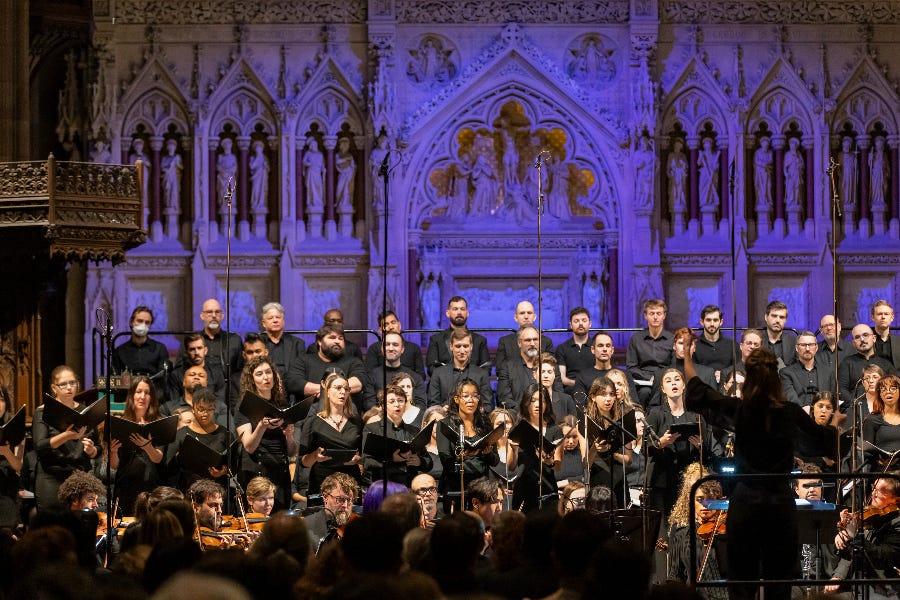
I can tell you a little bit about some of the newer music that we might do. I had been quietly planning for several weeks now, but I was only able to start working with the team on this about 10 days ago, so now we’re frantically planning. [Laughs] We had spring of 2024 planned out; that was already mapped out and done, and that won’t change. Some of my colleagues are conducting some of the concerts that we’ll be doing, and I’m looking forward to that.
And so next season, fall of ’24 into spring of ’25… we’ve been doing with our NOVUS Contemporary Ensemble this “Renewal” series. We did a couple of things with Richard Powers, and just some fantastic programs. It’s been so successful. We are looking to continue that into next year, as well.
We have a couple of specific pieces, but we can’t announce them quite yet. But some of the social justice issues we will continue to tackle in those series would be climate change, prison reform, and immigration. We’re doing this with our Faith Formation and Education departments, where we’ve been working in conjunction to present lectures and interviews, and then a concert to complement. So that’s all on the burner.
On one evening recently, I visited a recording session in the Trinity sanctuary, and I saw a lot of scaffolding and a lot of light coming through the back organ loft—which leads me to ask about the state of Trinity’s organ rehabilitation project.
The organ project has been ongoing for several years, but we see a light at the end of the tunnel. We expect to have both the front and the back usable by Christmas of 2024. It won’t be completed, but it’ll be usable. Right now when you come to a service here, you’re only hearing the front organ. And it’s about 1,500 pipes that are in use, of the 8,000 that eventually will be in use.
They are still in the process of installing all the pipes at this point. Our next step after the installation is complete is going to be the voicing of all those pipes. And the organ voicing for 8,000 pipes is going to take several months. Hence, a lot of our programming for next spring, and probably even into next fall a little bit, is going to be in St. Paul’s Chapel, because the only way to do that organ voicing is to have the space quiet. And it takes several technicians and specialists to be able to do this work.
It’s a very, very long process, but we see a light at the end of the tunnel: next Christmas, you will hear the sounds from both front and back. And once we’re totally completed, we’re going to be having an organ festival in 2025, probably, to celebrate that instrument. We will involve all the ensembles and bring in some guests, and it’ll probably be over this course of a month that we have a big festival to celebrate the new organ.
Trinity has a strong reputation for presenting new works, including commissions, many of which have achieved substantial acclaim outside the liturgical world. You’ve personally participated in pieces like Julia Wolfe’s Anthracite Fields and Ellen Reid’s p r i s m. Do you anticipate this activity continuing? And are there specific projects already underway, or is it way too early to talk about that?
It’s too early to talk about any specific big projects that might be underway. We have a couple of outside partnerships with other performing groups and producers, and we do have a couple of things underway for next year, but it’s too early for me to say what they are. But PROTOTYPE, we have an ongoing relationship with them, we work a lot with Paola Prestini and National Sawdust, of course, and a couple other collaborators that we’re not quite ready to announce what those projects are. But we will… I hope very soon.
And then in terms of commissions that might be for liturgical use, we actually do have a budget entity that we’ve created to do a commission project for liturgical music, very specifically. As we’re planning for the year, my colleagues and I really look at Sundays first. We’ll often come across a text that’s going to be read, but it’s like: wow, no one has set that particular scripture to music. We find that there are some big holes missing in the choral canon of liturgical music.
So we are planning to hire a curator to help commission, and do a commission competition. We’ll take a bunch of submissions, and we’ll choose five as the winners. We will present them in church, and perhaps we’ll be able to make a recording. That's not really starting until January, and it’ll take us a little time to get that together. But that’s in our hopper, so to speak.
It’ll continue to be a priority for us. We have been blessed with a wonderful gift here at Trinity, and I feel like we have to continue to be good stewards, and to represent all of those voices that have not been heard.
The Choir of Trinity Wall Street performs in El Niño: Nativity Reconsidered at the Cathedral of St. John the Divine in Morningside Heights on Thursday, Dec. 21 at 7:30pm; details and tickets here. Melissa Attebury conducts the Trinity Youth Chorus in Benjamin Britten’s Ceremony of Carols in St. Paul’s Chapel, Lower Manhattan, on Friday, Dec. 22 at 6pm; sold out, waitlist and livestream here.
In lieu of listings beyond what’s listed in the two features above, a reminder that friend, colleague, and Dada Strain impresario Piotr Orlov will host a holiday gathering and winter coat drive for newly arrived refugees on Thursday, Dec. 21, at 8pm at Sister’s, 900 Fulton St., Clinton Hill, Brooklyn. Details here.
For even more listings, see the Night After Night Watch master list, here.
Thank you.
(Photographs by the author, except where indicated otherwise.)
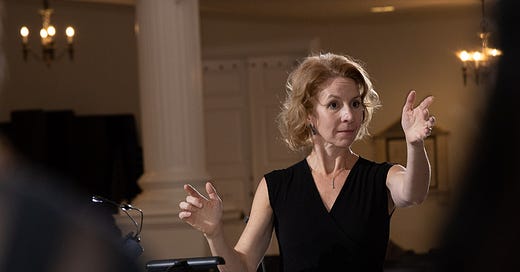


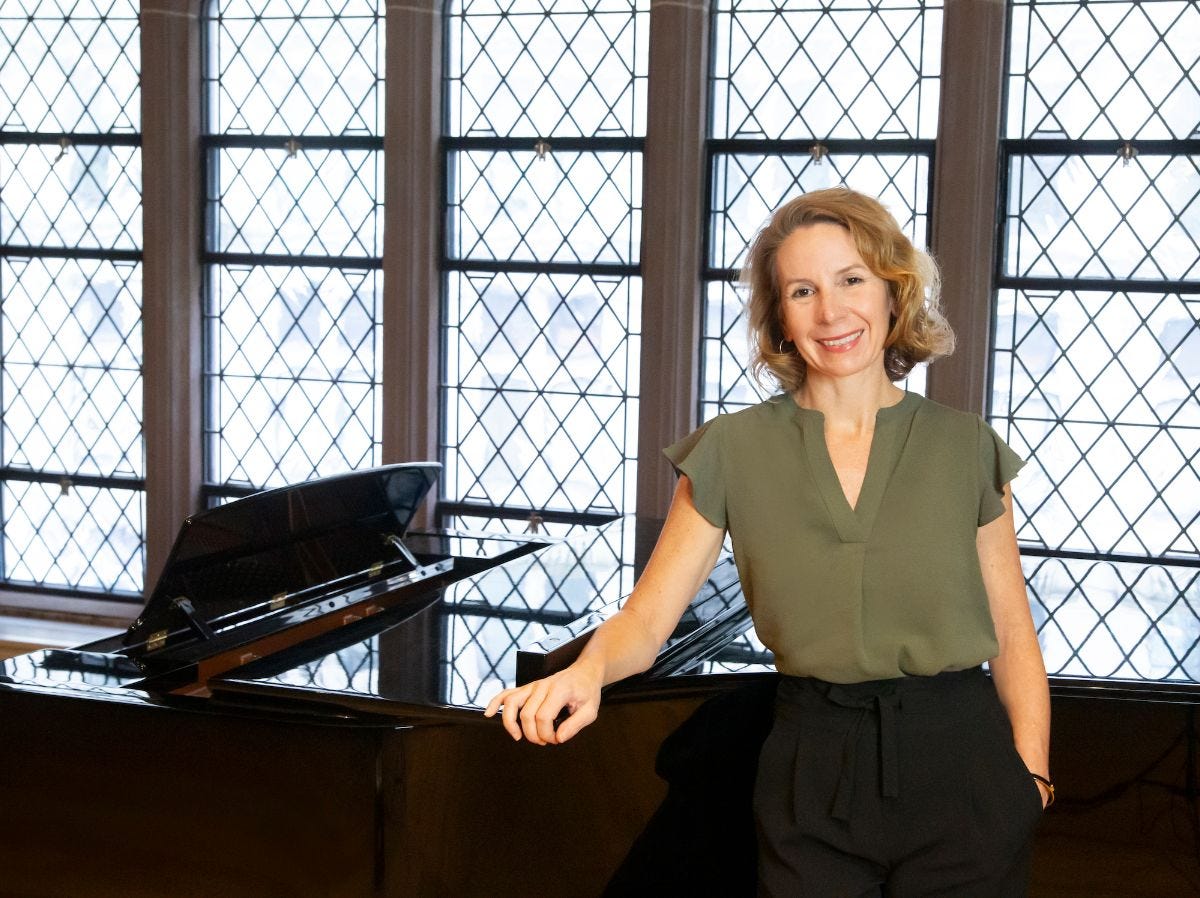



Thank you for the signal-boost. Happy Holidays to you and yours!